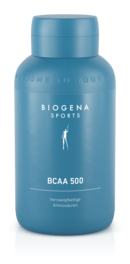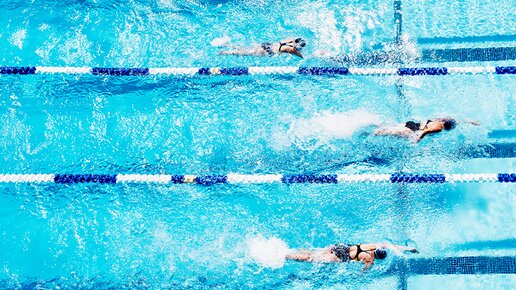For some people, just seeing a dumbbell seems enough for them to grow biceps and triceps. Others, however, toil away endlessly trying to get more muscular legs, a stronger chest or defined abdominal muscles. It is now known that it is a combination of effective training, restful breaks and proper nutrition that allows our muscles to grow. But what is the relationship between the three parameters and what is the most effective way to stimulate the muscle fibres to grow?
What do you need to build muscle effectively?
The basis is definitely the training of the muscles. Increased stress, which can be carried out until muscle failure, gives the muscle new stimuli and stimulates growth. Rest breaks are essential, because adjustment takes place during regeneration. In other words: Anyone who puts a strain on a muscle daily until exhaustion sets in will not see the desired gain because the body does not have time to adjust. In addition, it is also important to supply the muscles with the right nutrients.
Nutrition for building muscle – what should you eat?
Without the right diet, however, every exercise is pointless. If the muscle is not supplied with the correct fuel, it cannot grow and become stronger. Filling petrol in an electric car is also pointless.
So what should you eat if you want to build muscle mass? The triad of muscle hypertrophy consists of carbohydrates, protein and healthy fats – the so-called macronutrients.
Protein should consist of a mix of high-quality protein sources. As a parameter for this, the biological value, which has since become very outdated, was used for a long time, where the chicken egg represented the measure of all things. The chemical score, or CS for short, offers a more reliable and modern way to evaluate protein quality. This refers to the actual amino acid requirement of the human body and not to that of chicken eggs. The chemical score reliably shows how well the protein absorbed can be incorporated into our body and how many of the amino acids are excreted again. The optimal protein would have a CS of 100, but an above-average protein source can also have a higher CS. The advantage of this is that, for example, a lunch with a CS of 70 can be compensated by a protein shake with a CS of 150.
According to the recommendation of the German Society for Nutrition, 0.8 g of protein per kilogram of body weight should be consumed per day. However, if you want to build muscle mass or enjoy a lot of endurance sport, the requirement increases to 1.2 to 1.8 g per kilogram of body weight.
Not surprisingly, foods high in muscle-building protein are eggs, lean beef and chicken. But tuna, low-fat curd cheese, parmesan, chickpeas, tofu and lentils are also high in protein.
In order to further support muscle recovery, the supply of branched chain amino acids is recommended. Branched chain amino acids, or BCAA, are particularly relevant for gaining muscle mass and can even serve as an energy source for the muscle.
The semi-essential amino acid L-arginine can also support muscle growth because it promotes blood flow and the release of growth hormones. L-arginine can be consumed through a balanced diet, but like the BCAAs, it can also be consumed as a dietary supplement.
In addition to proteins, carbohydrates also play a much underestimated but very important role in muscle growth. Carbohydrates ensure that the amino acids are specifically transported into the muscle and also provide the muscle with the energy it needs for its growth and function. The hormone insulin, which the body distributes to exploit carbohydrates, also has an anabolic effect, i.e. a muscle-building effect. After training, simple carbohydrates such as white flour, rice or sugary foods or drinks are good, because the muscles here are particularly hungry. For other meals, it is beneficial to use “slower-burning” carbohydrates so that the insulin release is constantly stimulated over a longer period of time. These include oats, whole grain products, legumes, potatoes and similar.
Macronutrient distribution
For the distribution of macronutrients, the official recommendation of the German Nutrition Society (DGE) is as follows: more than half of the calories should be provided by carbohydrates, with a protein content of approx. 20 percent. The remaining maximum 30 percent is made up of healthy fats such as almonds, walnuts, olive oil and linseed oil, salmon and avocado. This distribution forms a reliable basis for most sports. However, depending on the nutritional goal (improvement in performance, building muscle mass or breaking down fat), this distribution can be individually adjusted.

This inhibits muscle growth
Just as there are foods that support muscle growth, there are of course those that inhibit or counteract it. Alcohol for example. Alcohol prevents the regeneration of muscle tissue even in small quantities, removes water from the body, which in turn reduces the nutrient and mineral supply to the muscles. Larger amounts then also lower testosterone levels – which is bad too, because the male sex hormone also plays a decisive role in muscle growth.
In addition, you should refrain from using convenience foods because they do not contain micronutrients and have other disadvantages. In turn, chocolate and sweets feed cravings and increase weight gain, because they contain a lot of simple carbohydrates in the form of sugar and a lot of fat.
Important vitamins and nutrients for muscle building
In addition to macronutrients, the body also needs certain vitamins and nutrients to allow muscles to grow properly through strength training. These include the trace element zinc, but also magnesium, vitamin D and omega-3 fatty acids. The latter support the body in regeneration and thus also increase resilience. Those who recover more quickly can resume intensive training sooner. If the muscle receives regular new stimuli, it grows faster.
To increase the effectiveness of muscle building, supplements can be a useful thing. However, as the name ‘food supplements’ suggests, they should be a supplement to a balanced diet that is tailored to your training goals. Capsules or tablets alone will not build muscle. Of course, supplements are no substitute for training.
Protein shakes are usually the first step towards consuming the right amount of protein, not only quickly after training, but also in a simple way.
One of the most popular, effective and best-researched supplements for muscle building is creatine. Taking creatine increases explosive power during short-term, intense exercise. Creatine also transports nutrients such as carbohydrates and protein to the muscles. This accelerates regeneration and supports the body in building new muscle mass. Creatine therefore improves performance, recovery and muscle mass gain.
Those who train intensively and want to significantly increase their muscle mass also benefit from BCAA supplements.
For athletic people who eat a balanced diet, a BCAA intake of 4 to 10 grams per day before or after training is a good measure for maintaining muscle protein status. During times of stress or competitive sports, the requirement increases, but how much BCAA is actually needed depends on many factors such as sporting activity, intensity of exercise, height and body weight.
As BCAAs are utilised directly in the muscles, they can contribute directly to muscle strength and endurance. They are an additional source of energy during training and stabilise performance.
Ashwagandha capsules can also support muscle growth. In our part of the world, the Indian plant ashwagandha is also known as ‘sleep berry’. Some studies have shown that an extract from this plant can increase muscle mass and strength.
The aforementioned omega-3 fatty acids can also be obtained through supplements. Supplementation is particularly recommended here, as even with regular fish consumption, Western societies do not achieve a sufficient intake of omega-3. The situation is even worse for vegetarians and vegans. Fish or algae oil, either in liquid form or as capsules, allows for easy dosing and a reliable supply of omega-3 fatty acids.
According to the BIOGENA GOOD HEALTH STUDY, the optimal omega-3 index is 10% – but only a few of the test subjects were able to achieve this. 88 out of 100 people were not optimally supplied (omega-3 index < 8%). On average, the test subjects achieved a value of only 6.34%. However, according to current thinking, most preventive effects only occur in the range of 8-11%.
Other useful muscle-building supplements include zinc , vitamin D and maca – a tuber from the Peruvian Andes that has earned a reputation as a superfood. Also vitamin B6, which has important functions in protein metabolism.
Insulin and muscle growth
The pancreatic hormone insulin is of great importance for muscle growth. If you consume carbohydrates, insulin is released. The higher level then helps muscles to absorb the carbohydrates and amino acids from food. In addition, the body’s energy stores in the muscles and liver are replenished. This is exactly what the body then accesses during training to cover the increased energy consumption – and the muscle mass is spared.
How long does building muscle take?
This depends on the training status. Committed beginners take about a month to gain one kilogram of muscle mass. The more advanced the athlete, the slower the muscle growth, because the body also has to supply the already existing muscle mass.
The balance between training and regeneration is also decisive. Working out every day is no good because the muscle doesn’t have time to recover and adapt. Too little training is also not expedient because the adjustment effect fades if a new stimulus is not added. Ideally, each muscle group should be trained two to three times a week. Initially, it will be three times easier to do than in the advanced state when the weights and thus the load are higher and consequently the regeneration also takes a little longer.
Losing weight and fat loss and muscle growth
Building muscle and losing fat at the same time is fundamentally possible. However, this only really works well for beginners. An adequate protein intake and a very small calorie deficit are necessary for this. For experienced athletes who often have lower body fat, splitting this into phases is more promising. In the so-called mass phase, you should consume more calories than you burn up through your basal metabolic rate and active metabolic rate so that the muscle gets enough food to grow. If you want to break down fat, you should consume fewer calories than you burn daily, so that your body is forced to get the energy it needs from your fat metabolism. Regular strength training is also necessary during this phase so that the body does not break down muscle and you have to start from the beginning again.
Does building muscle automatically lead to weight gain?
These two things go hand in hand. On the one hand, muscle mass simply weighs more. On the other hand, in the mass phase, in which you consume more calories than are burned, some of these calories are stored in the fatty tissue. If the daily calorie increase is quite low (in the range of an additional 100-200 kcal), then it is possible to reduce the increase in fatty tissue in the mass phase to a minimum.
Special features of building muscle as a woman
The principle of building muscle works equally for men and women. However, men have the advantage of naturally producing more testosterone to help to build muscle.
To achieve optimal effects, women should also align their training plan with their monthly cycle. Strength training makes sense in the first half around ovulation. In this phase, the oestrogen level increases, which can have a positive effect on strength training due to the anabolic effect. After ovulation, and until the period occurs, progesterone is increasingly released, which tends to have a catabolic, muscle-degrading effect.
Muscle development in old age
The good news: It’s never too late to train and build your muscles. But: It gets harder. If you do nothing to stop it, from the age of 30 your body starts the process of “sarcopoenia”, i.e. the breakdown of muscle mass. It is definitely makes sense to counteract this. However, because your metabolism slows with age and testosterone levels decrease, it takes longer for the desired effect to occur.
Frequently asked questions about building muscles
In addition to strength training, nutrition is essential. In order to build muscle, you have to eat more calories than you burn during the “mass” phase. As a result, the muscle gets sufficient food and can grow due to the training stimuli.
With the right combination of nutrition, nutritional supplements and effective strength training. All muscles should be exercised two to three times a week.
The rule of thumb is: Beginners build one kilogram of muscle per month with proper nutrition and efficient training. It takes longer for advanced athletes because the training stimuli are no longer so big.
A good all-round supply of vitamins is important for feeling energetic and fit. And that, in turn, is a prerequisite for intensive training. However, when it comes to muscle growth in the narrower sense, other micronutrients should be on your supplement list: protein powder, creatine, BCAAs and, if necessary, supplements containing zinc, glutamine or magnesium.













